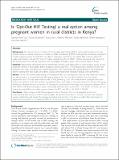Is 'Opt-Out HIV Testing' a real option among pregnant women in rural districts in Kenya?
View/
Publication Date
3/8/2011Type
Article, Journalviews
downloads
Metadata
Show full item recordCitation
Ujiji, O.A., Rubenson, B., Ilako, F. et al. Is 'Opt-Out HIV Testing' a real option among pregnant women in rural districts in Kenya?. BMC Public Health 11, 151 (2011). https://doi.org/10.1186/1471-2458-11-151
Abstract/
Background An 'opt-out' policy of routine HIV counseling and testing (HCT) is being implemented across sub-Saharan Africa to expand prevention of mother-to-child transmission (PMTCT). Although the underlying assumption is that pregnant women in rural Africa are able to voluntarily consent to HIV testing, little is known about the reality and whether 'opt-out' HCT leads to higher completion rates of PMTCT. Factors associated with consent to HIV testing under the 'opt-out' approach were investigated through a large cross-sectional study in Kenya. Methods Observations during HIV pre-test information sessions were followed by a cross-sectional survey of 900 pregnant women in three public district hospitals carrying out PMTCT in the Busia district. Women on their first antenatal care (ANC) visit during the current pregnancy were interviewed after giving blood for HIV testing but before learning their test results. Descriptive statistics and multivariate regression analysis were performed. Results Of the 900 women participating, 97% tested for HIV. Lack of testing kits was the only reason for women not being tested, i.e. nobody declined HIV testing. Despite the fact that 96% had more than four earlier pregnancies and 37% had been tested for HIV at ANC previously, only 17% of the women surveyed knew that testing was optional. Only 20% of those surveyed felt they could make an informed decision to decline HIV testing. Making an informed decision to decline HIV testing was associated with knowing that testing was optional (OR = 5.44, 95%CI 3.44-8.59), not having a stable relationship with the child's father (OR = 1.76, 95%CI 1.02-3.03), and not having discussed HIV testing with a partner before the ANC visit (OR = 2.64 95%CI 1.79-3.86). Conclusion High coverage of HIV testing appears to be achieved at the cost of pregnant women not understanding that testing is optional. Good quality HIV pre-test information is central to ensure that pregnant women understand and accept the reasons for testing and will thus come back to collect their test results, an important prerequisite for completing PMTCT for those who test HIV-positive.
Subject/
Pregnant Woman; Informed Decision; PMTCT Program; Voluntary Consent; Busia District
Further Details
© 2011 Ujiji et al; licensee BioMed Central Ltd. This is an Open Access article distributed under the terms of the Creative Commons Attribution License (http://creativecommons.org/licenses/by/2.0), which permits unrestricted use, distribution, and reproduction in any medium, provided the original work is properly cited.
Publisher
BioMed CentralCollections
- General - GEN [367]

